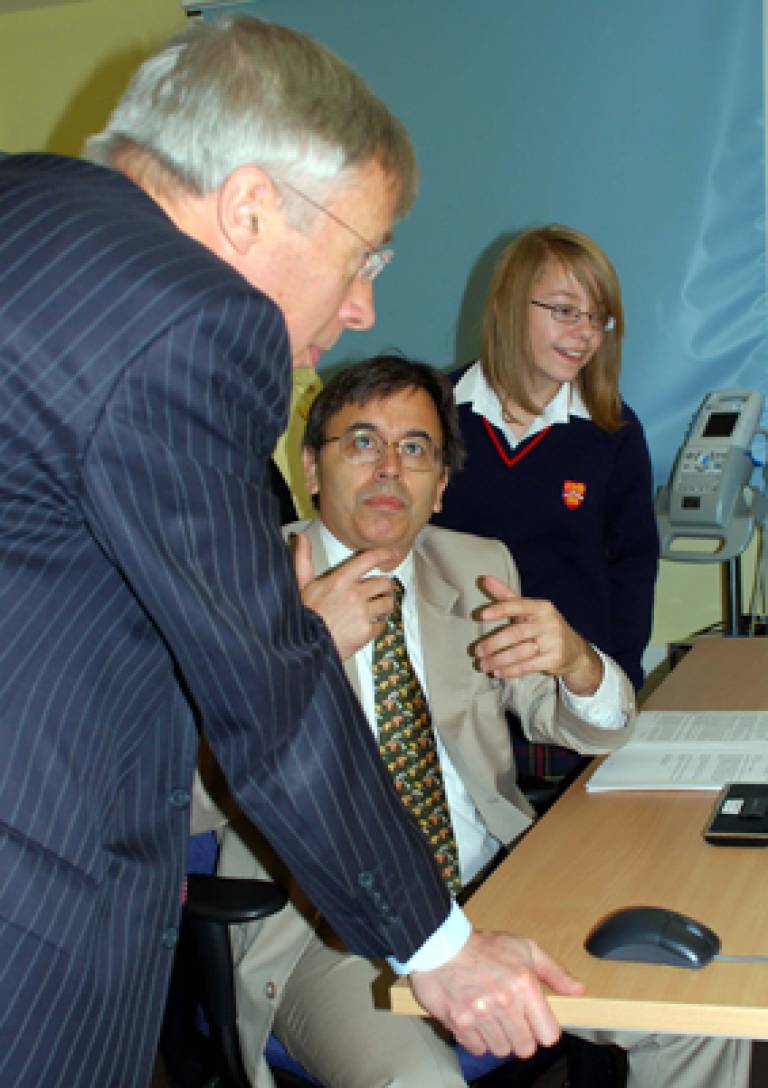New minister chooses the Institute of Ophthalmology and Moorfields Eye Hospital for early official visit
11 June 2010
Earl Howe, health minister in the new coalition government, chose
 ucl.ac.uk/ioo/" target="_self">UCL Institute of Ophthalmology and Moorfields Eye Hospital as the destination for one of his first official visits in his new role last week.
ucl.ac.uk/ioo/" target="_self">UCL Institute of Ophthalmology and Moorfields Eye Hospital as the destination for one of his first official visits in his new role last week.
The minister, whose responsibilities include research and development and innovation, met with several clinical and research staff as well as patients who have benefited from ground-breaking research undertaken by Moorfields and the Institute.
Health minister Earl Howe said: "It is exciting to see first hand how innovative technology will give NHS patients the very best treatments and also furthers the UK's standing in the biomedical research industry.
"Basing decisions for treatment on the latest research evidence helps NHS doctors, nurses, GPs and health professionals to provide patients with the most effective and appropriate care.
"We want to give more patients the opportunity to take part in clinical trials wherever they live in the country, and we therefore need to encourage pharmaceutical, biotech and medical devices industries to conduct trials in England rather than abroad."
Professor Peng Khaw, Moorfields' director of research and development added: "We were delighted to have the opportunity to tell the new minister about just a few of the important research initiatives going on here at Moorfields and the UCL Institute of Ophthalmology.
"Our partnership with the institute and our joint status as the only specialist ophthalmic National Institute for Health Research biomedical research centre means that we are able to develop innovative treatments for a range of eye diseases and make a real difference to our patients' lives - not just now, but in the future too."
During the visit, Earl Howe, accompanied by Professor Dame Sally Davies, the interim chief medical officer and director general for research and development at the Department of Health, found out more about a range of initiatives taking place at Moorfields and the institute, including:
- The development of a novel anti-scarring tablet, currently being tested in the laboratory, which has the potential to prevent the need for numerous operations following surgical treatment for glaucoma, one of the most common eye conditions and the world's leading cause of preventable blindness
- The Moorfields motion displacement test, an award-winning computer-based test, which offers a portable, affordable and easy-to-use alternative to traditional glaucoma detection tests
- The London Project to Cure Blindness, which is exploring the use of stem cell technology to replace eye cells affected by age-related macular degeneration, the leading cause of blindness in people over the age of 60 in the western world
- Corneal stem cell transplantation, a new technique to restore function to a damaged cornea in patients who have suffered an eye injury or disease system for detecting glaucoma in the community
- Gene therapy for the treatment of inherited retinal disorders, which was first performed at Moorfields in 2007 and has since been used to treat eight adults and children suffering from RPE65 deficiency, a rare genetic disorder
The minister also visited Moorfields' specialist A&E department, one of the only of its kind in London, which sees between 180 and 280 patients every day for a range of urgent eye complaints.
Image: Health minister Earl Howe with Moorfields glaucoma patient Julia Margetts and Professor Steven Brocchini, who is working on a new anti-scarring treatment.
 Close
Close

